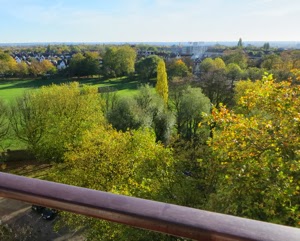Christmas by Candlelight was given by one of Oxford's superb choirs, Jubilate. The city seems to exude musical richness, not least of course because many colleges have organ scholars, there is a music faculty, the cathedral is a centre of musical excellence, and a number of colleges have notable directors of music and even (Christ Church, Magdalen and New College) superlative boys' choirs fed by their own choir schools.
Keble College came out of the high church Anglican tractarian movement and the chapel exhibits characteristics which can be both absurd and magnificent. It is controversial, and that fact on its own infuriates me. People are so judgemental! The chapel towers into the sky as we would all love to do, and once inside you experience the extraordinary ambition and potential and (mediated by the giant Doom on the west wall) ambiguity of human existence.
It's impossible to describe what you will find on entering this place. Lit with candles and nightlights, its murals aglow, it's better not to attempt it here! But thanks to Angela for the photo, taken just before the choir took their places in the chancel.
Afterwards at the Lebanese restaurant in Jericho, where we have often enjoyed excellent mezes and a surprising glass or two of Lebanese wine or beer, the scales suddenly fell from my eyes as I realised that much if not all of this food is bought in ready cooked. In fact, I did a little googling after we went to a pub in Shropshire and passed a stack of ready cooked lamb shank meals piled in cardboard boxes in the entrance. You suddenly realise that many, and almost certainly most, pubs these days buy in most of their menu in bulk from specialist suppliers. The menu at the Tite Inn in Chadlington is an example of this. The food is excellent, and I'm not complaining about the quality of many of the meals that come this way, some to be microwaved, some popped in the oven, and others to be vigorously 'boiled in the bag'. What I find hard to swallow (sorry!) is the fact that these establishments talk happily of their 'chef'. A plastic bag of frozen stew is immersed in boiling water for 25 minutes, plated with potatoes and a couple of vegetables (which may or may not have been 'prepared' in the kitchen) or a side salad, and delivered to the customer.
I am sure, though I have yet to check this out, that most people believe there is a kitchen in the back of the pub where a chef and his team are preparing and cooking the dishes on the menu.
Sorry, no. Google for pub or restaurant food suppliers and you will see how it works. And there are many suppliers you won't find that way, perhaps for obvious reasons. As one website explains, take over a pub or open a new restaurant or cafe and the company reps will be on your doorstep.
Of course, establishments who buy in their food in this way can offer menus of often truly spectacular proportions. The size of the menu is really only constrained by the capacity of their freezer(s). So a pub with a very extensive and diverse menu may be working this way, especially if they don't appear to be terribly busy... Try checking round the back (if you can!) and see if there is sign or smell of a busy kitchen.
So who cooks their own food? Locally I am sure The Bull in Charlbury does, and the same goes for the Plough in Finstock and the Royal Oak in Ramsden. Do you know other places? Add your 'comment' below.
















